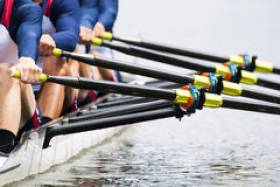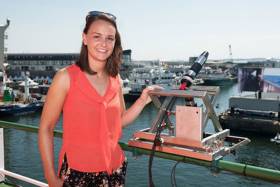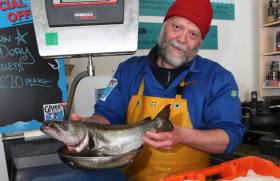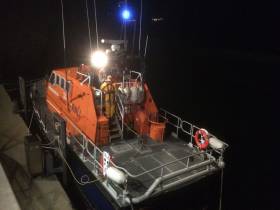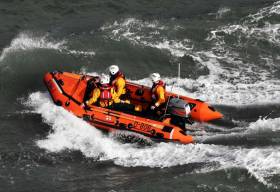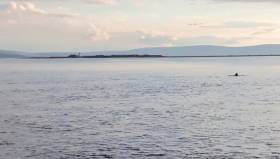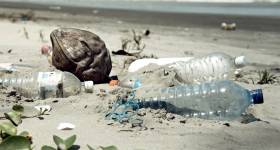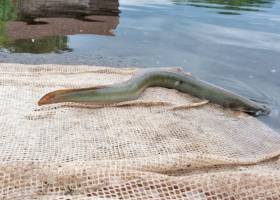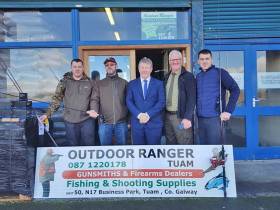Displaying items by tag: Galway
Irish Composite Crews Lead the Way at World Masters
#Rowing: A composite of five crews – Galway, Neptune, Commercial, Clonmel and Cork – won in the men’s eight for 50 and over at the World Masters Regatta in Budapest. It was one of a sequence of wins for the Irish at the huge event.
Brendan Smyth and Patrick Fowler, rowing for Commercial, won the Pair in the A class, while Denis Crowley and Tony Corcoran won in single sculls.
Two C fours (43 or more) won and an E coxed four (55 or more) also took the honours.
World Masters Regatta, Budapest, (Selected Results, Irish interest, winners)
Wednesday
Men
Four, coxed E (55 or more) – Heat Four: 1 Belfast BC, Commercial, Galway, Leichhardt RC (C Hunter, A McCallion, M Heavey, G Canning; cox: JM Marks) 8:05.40
Thursday
Men
Eight (D – 50 or more) – Heat Two: Galway, Neptune, Commercial, Clonmel, Cork (B Crean, B Smyth, R Caroll, O McGrath, G O’Neill, P Fowler, D Crowley, G Murphy; cox: M McGlynn) 3:05.06.
Four (C – 43 or more): Heat Three: Commercial, Galway, Clonmel, Neptune (R Carroll, O McGrath, P Fowler, G O’Neill) 3:15.28. Heat Six: Commercial/Neptune (D Smyth, F O’Toole, G Murphy, D Crowley) 3:15.54.
Pair (A – 27 or more): Heat Three: Commercial (P Fowler, B Smyth) 3:32.68
Sculling, Single – (D – 50 or more) – Heat 15: Commercial (D Crowley) 3:55.15.
(H – 70 or more) – Heat Eight: 1 T Corcoran 4:27.08.
PhD student Catherine Jordan will bring her research on phytoplankton blooms to the third annual Soapbox Science even in Galway tomorrow afternoon (Saturday 29 June).
She will be among 12 female scientists standing on their soapboxes to talk about their groundbreaking research in the areas of science, technology, engineering, mathematics and medicine at the city’s Spanish Arch from noon to 3pm.
Jordan, a PhD candidate through the Marine Institute’s Cullen Fellowship Programme and NUI Galway, will discuss her research on using satellite technology to observe and identify phytoplankton blooms in North-East Atlantic waters.
“When conditions are right, phytoplankton appear in high numbers and produce green and dark red hues in the water and are known as ‘algal blooms’,” she explains.
“As these blooms can sometimes be visible from space, satellites provide a useful tool in monitoring the location and extent of these blooms.
“In most cases phytoplankton blooms are of benefit to the ecosystem, but a small proportion of phytoplankton species produce toxins which may affect other marine life.
“Satellites may be able to assist in providing early wide-scale warnings of the presence of algal blooms, by using ocean colour sensors. A lot of my research focuses on measuring optical properties of light by using different instruments and methods, as well as validating satellite measurements.”
Jordan recently joined the Marine Institute’s annual ocean climate research survey on the RV Celtic Explorer to collect plankton samples and hyperspectral radiometer data as part of her PhD research.
Speaking about the Soapbox Science even, Jordan said: “I am very passionate about my field of science and also promoting how women can work on marine research vessels and spend weeks at sea.
“It is very important to engage the public in learning about marine science in interactive ways in order to explain very complex matters. Soapbox Science is an excellent platform for promoting women in science and encouraging the public to discuss topics they may not have encountered before.”
Soapbox Science Galway began two years ago, and talks this year will cover a diverse range of topics such as enhancing farming using insects, the marvels of human milk, the internet as a force for good, and statistical thinking for real-life questions.
The event will also be held in Dublin and Cork, as well as in several countries around the world including the UK, US, Canada, Australia, Sweden, Germany, Brazil and South Africa.
For the full list of participants and more information about Soapbox Science visit soapboxscience.org
#Rowing: The hosts won the men's senior eights title at Trinity Regatta today. The Trinity/Lady Elizabeth crew had a length and a quarter to spare over Blue Star, a British crew which featured Scott Durant, an Olympic gold medallist, along with former Ireland internationals Cormac Folan and Niall Kenny.
The men's senior singles went to Michael Maher after a disqualification. The race featured a clash between the two Commercial men, after which Niall Beggan was disqualified.
The women's novice eight gave DULBC a chance to show their mettle. They raced Neptune in the final and won well. Bann's women's junior 18 eight looked strong and crossed the line ahead of Graiguenamanagh - but Bann were disqualified for not staying the right side of a buoy.
Brian Colsh of Sligo continued his good run by taking the men's junior 18 single, while Galway beat Blackrock in the men's junior 16 eights final.
One Galway fishmonger stocking up ahead of the perennially busy Good Friday trade got more than he bargained for with his catch of the week.
Stefan Griesbach from Gannet Fishmongers and Eatmorefish.ie came across a fish a lot more unusual than the average cod and whiting in the 2kg meagre (Argyrosomus regius) — also known as the croaker fish — a relative of the stone bass which is a farmed fish popular on many Irish restaurant menus.
Common in the waters in south-west of France or west of Africa, the meagre, despite its name, is not so small by nature.
Indeed, the 2kg specimen Stefan spotted in Rossaveal on Monday (14 April) is just a fraction of its cousins that can reach up to two metres in length and weigh more than 200kg.
Meagre is a renowned game fish but also prized for its meaty fillets, which was the big attraction for Stefan when he found it in a mixed box of fish, having been caught by the MFV Killoran south of the Aran Islands on its first trip.
However, before taking the knife to this unique Easter treat, Stefan got in touch with Dr Declan Quigley of the Sea Fisheries Protection Authority to find out just how rare his purchase really was.
And he was surprised to learn that records show only two other meagre/croaker catches in Irish waters, at Passage West, Co Cork in 1840 and Annagassan, Co Louth in 1896 — both in the Victorian era of the 19th century.
Now the special catch is up for auction in aid of the RNLI. Bidding starts at €75 for the auction which closes midday on Thursday 18 April so be sure to act fast.
Baltimore Lifeboat In Medical Evacuation From Sherkin Island
#Lifeboats - Baltimore RNLI carried out a medevac on Thursday night (11 April) from Sherkin Island off the coast of West Cork.
The volunteer crew launched their all-weather lifeboat following a request from the Irish Coast Guard at 9.29pm to provide medical assistance and evacuation to an islander living on Sherkin.
Conditions at sea during the callout were calm with good visibility and no sea swell.
The lifeboat arrived at Sherkin pier at 9.45pm, the casualty was brought onboard and the lifeboat departed the island within four minutes, handing the casualty over to the care of HSE ambulance crew at 10.08pm.
Speaking following the callout, Kate Callanan, Baltimore RNLI volunteer lifeboat press officer, said: “Baltimore RNLI regularly provides the vital service of medical evacuations (medevacs) for residents and visitors to local islands such as Sherkin, Cape Clear and Heir.
“If you find yourself in need of medical assistance, call 999 or 112 and ask for the coastguard.”
Elsewhere, volunteer lifeboat crews from the Aran Islands and Galway RNLI participated in a multi-agency training exercise on Galway Bay this week.
The all-weather lifeboat from Aran Islands RNLI and the inshore lifeboat from Galway Bay RNLI were among the many emergency service agencies that took part in a maritime mass rescue exercise.
The scenario training, which saw the lifeboat crew practise an evacuation of survivors from a seagoing ferry in a busy shipping lane, was organised as part of a multi-agency exercise co-ordinated by the Irish Coast Guard.
Among the other agencies involved were the Irish Coast Guard rescue helicopters located at Sligo and Shannon, Doolin/Inisheer Boat Unit, Costello Bay, Killaloe, Kilkee and Cleggan Coast Guard units, Galway Fire Service and the HSE.
Wicklow Lifeboat Launched To Search For Missing Dog
Wicklow RNLI's inshore lifeboat was launched at 4:40pm yesterday afternoon (Friday 8 March) to search for a missing dog.
The alarm was raised by the anxious owner after her dog, named Otis, chased some seagulls down over the cliff edge at Wicklow Head and disappeared.
The lifeboat — with helm Graham Fitzgerald and crew Ian Thompson and John Stapleton — was on scene eight minutes after launching and the crew began a sweep of caves and the shoreline at a location known as the Pond, near Wicklow Head lighthouse.
During the search the dog could be heard barking from a cave, so crew member Stapleton was put ashore near the opening and, with some persuading, the dog was coaxed out to climb back up the cliff and into the arms of his grateful owner.
Elsewhere, a young man was recovered from the River Corrib by members of the emergency services in Galway in the early hours of Friday morning following a major rescue operation involving the Galway RNLI lifeboat.
The man has got into difficulty in a canal beside the river around 3.30am, and during the rescue both the casualty and rescue personnel ended up entering the fast-flowing Corrib towards the Spanish Arch, where the casualty was recovered for transfer to Galway University Hospital.
Mike Swan, Galway RNLI lifeboat operations manager, said: “We would encourage all members of the public to respect the water at all times regardless of their activity.
“Be wary of all edges around the sea and watersides. Slips and falls happen in all locations.”
Galway’s Dolphin Nimmo Returns To City Waters
#MarineWildlife - Galway residents have a great opportunity to see a wild dolphin close to the city centre with the return of regular visitor to the Nimmo’s Pier area this week.
Nicknamed Nimmo, the solitary bottlenose dolphin was first sighted in the city in April 2015 and since then has become an annual fixture, appearing and staying longer each time.
The Irish Whale and Dolphin Group (IWDG) suggests this is a sign that the area around Galway city is now a “more important core feeding habitat for Nimmo”.
In other news, the IWDG’s research vessel Celtic Mist will embark on a series of week-long surveys this summer in search of humpback whales.
IWDG members are invited to join any of the nine legs, the first of which sets sail from 9-15 June (weather permitting) between Cork and Dingle/Fenit.
For details on how to book a place on any of these voyages and for further information, contact [email protected].
Public Lecture On Marine Litter Tonight In Galway
‘Marine litter: are there solutions to this global environmental challenge?’ is the title of a free public lecture at 7pm tonight (Thursday 10 January) in the main concourse of GMIT’s main Galway campus.
Prof Richard Thompson from the School of Biological and Marine Sciences at Plymouth University will deliver the lecture ahead of the second Ecology and Evolution Ireland Conference at GMIT and NUI Galway this weekend.
Prof Thomson will discuss issues surrounding the widespread distribution of plastic debris at the sea surface, on the sea bed and on shorelines.
Nearly 700 marine wildlife species are known to encounter marine litter, with many reports of physical harm resulting from entanglement in and ingestion of plastic.
At the same time it is very clear that plastic items bring many societal benefits. Can these benefits be achieved without emissions of waste to the environment?
Progress requires systemic changes in the way we produce, use and dispose of plastic. Prof Thomson will suggest that a key solution to two major environmental problems, our non-sustainable use of fossil carbon (to produce plastics) and the accumulation waste, lies in recycling end-of-life plastics into new products.
While the two days of the conference on Friday 11 ad Saturday 12 January are now fully booked, attendance at this evening’s lecture is remains open and free to all.
Payouts For Former Eel Fishermen In Galway From This Month
Former commercial eel fisherman in Galway will receive compensation up to a maximum of €3 million from this month, as Galway Bay FM reports.
Applications were opened till the end of November for the Support Scheme for Former Feel Fisherpersons which will offer restitution payments to those who were actively engaged in the commercial eel fishery before it was closed in 2009.
More recently, Ireland’s eel fishermen have been involved in a scientific fishery gathering data from key catchments to map out the health of the species around the country.
New Angling Outreach Initiative Reels In Novices In Galway
#Angling - The Outdoor Ranger Tuam Angling Education Programme provides information sessions, skills workshops and fishing excursions to young people who may be interested in trying out the pursuit.
Sean Canney TD, Minister of State with responsibility for inland fisheries, expressed his full support for the Tuam-based programme this week and welcomed the funding from Inland Fisheries Ireland’s National Strategy for Angling Development Fund to support its rollout.
“This programme will encourage and engage young people in angling and allow experienced volunteer anglers from local clubs to pass on their knowledge and skills to the next generation,” Minister Canney said.
“Collaboration such as this is vital to ensure that these skills, developed over many years, are not lost. I am particularly pleased that the Outdoor Ranger Tuam Angling Education Programme is supported locally by Cairde an Chláir working with Inland Fisheries Ireland.”
The programme commenced in October with a strong uptake, and participants enjoyed guest appearances from well-known anglers during the programme.
Nathan Creaven from Kilconly, Tuam who fly-fished for Ireland earlier this year, demonstrated his fly-tying skill, while Owen Trill, and international fly-tier from Galway, gave his own demonstration at one of the skills workshops.
The information sessions and workshops aimed to provide students with the basic skills necessary for recreational angling. Young people took several lessons on several topics including sustaining quality habitats, line rigging, baiting, knot-tying, casting techniques, fish retrieval, fish handling, catch and release, rules and regulations of angling and biosecurity.
In addition, they enjoyed a fishing trip to Oughterard Fishing School where they had the opportunity to put their new found angling skills to practise.
The programme received funding from IFI’s National Strategy for Angling Development Fund. The strategy aims to ensure that Ireland’s angling resource is protected and conserved in an environmentally sustainable manner for future generations to enjoy while also striving to make angling an accessible and attractive pursuit for all.
Suzanne Campion, Head of Business Development at Inland Fisheries Ireland said: “We are delighted to support the Outdoor Ranger Tuam Angling Education Project through our National Strategy for Angling Development.
“It is through partnerships such as this one [in Tuam], where local fishing clubs and associations are working together in a constructive and positive manner, that we will secure the future of our fisheries resource,” said Suzanne Campion, IFI’s head of business development.
Teresa Kelly from the Outdoor Ranger shop in Tuam added: “Learning to become an angler is something we took for granted when we were young. We took our bike out and headed off to the river for the day. But this is a thing of the past and the amount of young people that don’t know anything about angling, or that it’s even a sport, is shocking — especially as we have the finest rivers and lakes at our doorstep.
“This is the issue that the Outdoor Ranger Tuam Angling Education programme wants to highlight and also to make changes by providing information and day trips out fishing with young people to give them to the opportunity to learn and gain a love of angling.”
In other news, applications are open till 5pm this evening (Friday 30 November) for the Support Scheme for Former Eel Fisherpersons.
The fund offers a restitution payment specifically targeted at former licensed eel fisherpersons who were actively engaged with the commercial eel fishery prior to the National Eel Management Plans and the 2008 public consultation which subsequently lead to the closure of the commercial eel fishery.
Details on the scheme are available on the IFI website. Late applications will not be accepted.


























